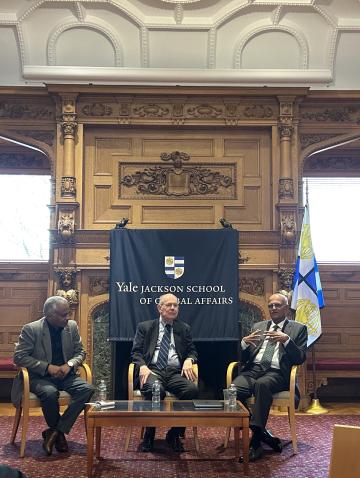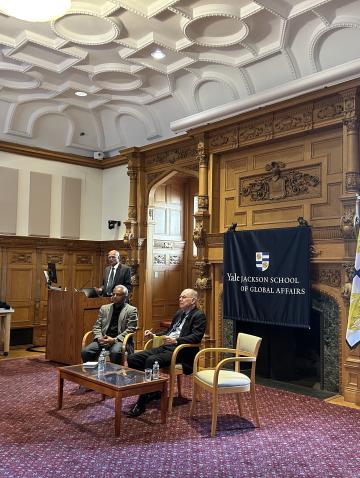Navigating the New World (Dis)Order: India's Strategic Challenges and Opportunities

Sushant Singh, John J. Mearsheimer, and Shivshankar Menon in conversation at Horchow Hall on April 25, 2025.
The first half of 2025 has seen the already-teetering post-Cold War order topple. The United States is embracing tariffs, the transatlantic alliance is fraying, and artificial intelligence advances seem to herald economic transformations for both rich and poor. These upheavals pose domestic and geopolitical challenges that will test wealthy and powerful countries, but which they are likely to weather. What, though, of the world’s emerging powers, pinned between the obligation to deliver a better future for their citizens and that future’s sudden uncertainty?
On Friday, April 25th, two of the world’s leading international affairs scholars visited Yale to offer visions for how India can navigate these stormy waters. Shivshankar Menon, Visiting Professor of International Relations at Ashoka University and former National Security Advisor to the Prime Minister of India (2010–2014), argued that India faces “a world adrift,” with tremendous uncertainty but high potential for growth. John Mearsheimer, R. Wendell Harrison Distinguished Service Professor at the University of Chicago, argued that the world is getting more dangerous, which is bad for India but likely to result in close ties between it and the United States.

Shivshankar Menon delivers his opening remarks.
Menon began his remarks by explaining that he used to describe the world as one “between orders.” He now describes it as a world adrift. The West as a cohesive geopolitical bloc has cannibalized itself, and multilateralism is dead, he argued. The globe has become “economically multipolar, politically confused, and militarily unipolar,” with narrowing gaps between the most powerful states and their regional rivals. Those conditions, Menon posited, have produced a world that looks disordered and uncertain, but which may share similarities to nineteenth-century Europe. That was a period of cultural creativity, growth in productivity and technological innovation, and international political entrepreneurship—in other words, an era of changes, but not necessarily negative ones.

John J. Mearsheimer delivers his opening remarks.
Mearsheimer offered the perspective that the world today is dangerous and going to get more dangerous. In India’s case, the proximate cause of that danger is its border with China, which he described as “Godzilla.” Mearsheimer argued that China seeks to dominate East Asia and then to project power globally. Its desire to revise the international order, in imitation of the United States after World War II, and the difference in circumstances between war today—at sea, between energetic powers—versus a land war in fatigued Europe after World War II, may make war more likely than during the Cold War. Mearsheimer predicted that India, given how much poorer it is than China, will experience difficulty competing with China. It will cultivate a closer relationship with the United States to help counter China’s economic and military superiority, but that relationship will be of limited use for resolving other irritants, like the relationship with Pakistan.
After their initial remarks, Menon and Mearsheimer took questions and discussed the priorities that will shape India’s medium-term decisions. Menon pointed out that China, unlike the United States, is not a regional hegemon and will face opposition from its neighbors if it tries to exercise power the way the United States has over the last century. This will also be true in the Indian Ocean, an open ocean that is challenging for any single power to dominate. Mearsheimer, addressing a question about the United States-India relationship, argued that the United States will invest in growing India’s economy and security capabilities to cultivate a counterweight to China. He added that in Europe, where Mearsheimer has long argued that the United States ought to cultivate Russia as a similar ally against China, the unraveling of NATO would produce more independently minded European states.

Sushant Singh, John J. Mearsheimer, and Shivshankar Menon engage in closing discussion.
The conversation was moderated by Sushant Singh, consulting editor for Caravan and Lecturer in South Asian Studies at Yale University. The event happened in the immediate aftermath of the devastating terrorist attack in Pahalgam, a resort in Indian-administered Kashmir. That tragedy drove home the depth of the challenges India faces and the importance of bringing leading theorists and practitioners into dialogue with Yale’s own depth of talent to spur minds into thinking of solutions to these problems.
- Good Governance